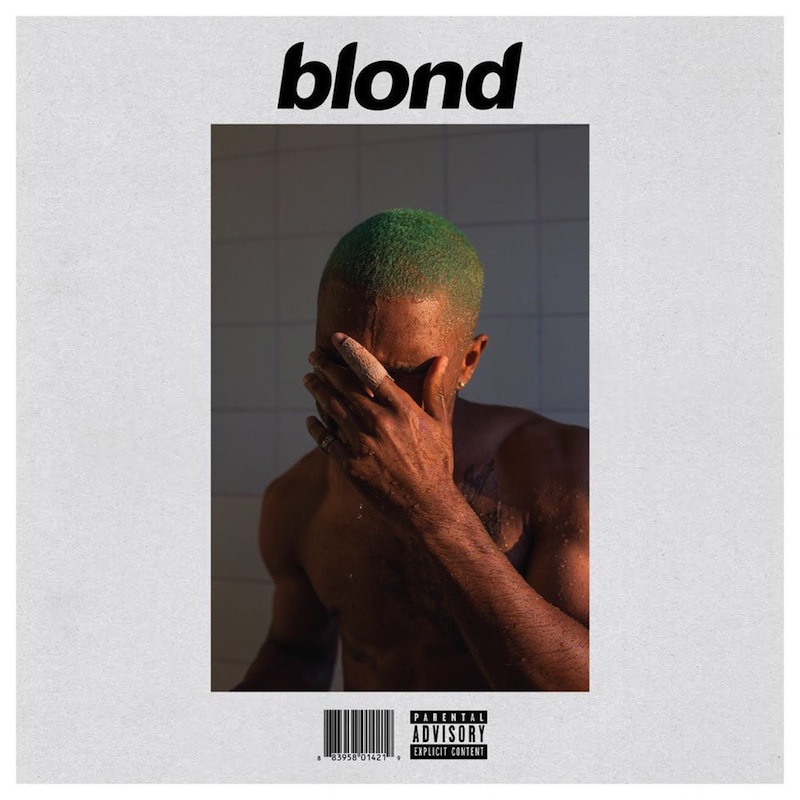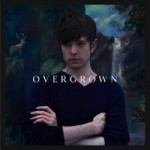Album of the Week: Frank Ocean – Blond

Few musicians make us wonder like Frank Ocean does. Not just about release dates—although his coyness in that regard created a din of public anticipation that threatened to drown out the actual music—but about who Frank Ocean is, really. He’s reclusive, chameleonic, his elusiveness thrown into sharp relief by his frequent collaborations with larger-than-life, all-too-accessible figures like Kanye West and Tyler, The Creator. Hell, we know more about Earl Sweatshirt than we do Frank Ocean, and Earl makes a point of not leaving his house.
Even in his music, it’s often been hard to pin down Ocean’s identity. Channel Orange saw him fully inhabiting a swath of fully realized characters, from trust-fund teens to ancient Egyptians to destitute junkies. It’s hard not to look at the Frank Ocean who created Nostalgia, Ultra as a sort of character as well, an embodiment of sensitive, fragile masculinity that gets jealous when his girlfriend listens to Drake and Trey Songz instead of his “Songs 4 Women”—a persona that’s not quite compatible with the fluidity of Ocean’s actual sexuality. Ocean realizes all of these characters with deep empathy—what made Channel Orange a classic was the ease with which he shifted between its characters’ diverse inner worlds—but a large chunk of his discography presents itself with the knowing distance of a work of fiction.
That makes it all the more surprising when Blond appears to shed most of that artifice. This isn’t an album of stories and characters—at least, not as explicitly as Ocean’s earlier releases was. There isn’t the expository scene-setting to let us know we’re in Ladera Heights or Little Rock, Arkansas; instead, the songs here appear to be anecdotal snippets from Ocean’s own life: failed relationships, drug use, getting displaced by Hurricane Katrina, coping with unrequited love. It feels as personal as “Bad Religion” did, but now there’s no taxi driver as an intermediary. Frank’s emotion here is as direct as it’s ever been.
But that directness doesn’t make Blond an easier album than its predecessors. The opposite is true, actually. There’s no channel-flipping structure to delineate these stories, and Ocean’s lyricism here is more impressionistic than ever. And because there’s so little public knowledge of Ocean’s personal life, the impulse to cross-reference these songs with biographical details very quickly becomes an uphill battle. That’s the paradox of Frank Ocean: the closer he lets us get, the more of a puzzle he becomes.
Musically, Blond mirrors that difficulty, featuring some of the most ambitious songwriting of Ocean’s career. There’s nothing as showy here as “Pyramids,” but its shadow is felt on tracks like centerpiece “Nights,” which pulls a similar trick in transitioning between an uptempo first half into a woozily introspective back half, tied together by reminiscences of a lover from a “past life,” before his rise to stardom. Other songs, like “Nikes” and “Self Control,” similarly feel like collections of separate ideas that have been smoothed together to create a cohesive whole. And then there’s the chaotic “Pretty Sweet,” the album’s most interesting track, which dizzily charges through churning guitars, children’s choirs, breakbeats, and pitch-shifted choruses of Ocean himself—all over the course of a particularly dense 2:38. It’s a manic, chaotic side of Ocean we’ve never seen before, and it’s almost the most exciting part of the album.
Almost, because it follows a minute-long interlude by André 3000, who breathlessly tumbles through his most energetic verse in recent memory. That track, “Solo (Reprise)” is a breathless leap through feelings of depression, inadequacy, substance abuse, and frustration, ending on a note calling out rappers who don’t write their own verses. “I’ve stumbled and lived every word,” he concludes. “Was I working just way too hard?” It’s the kind of verse that makes you wish André didn’t just limit himself to guest spots anymore; it’s also a distillation of one of Blond’s most prominent themes: authenticity.
It’s an interesting continuation from Channel Orange closer “Golden Girl,” the last line of which saw Tyler, The Creator hoping that the titular golden girl didn’t turn his neck green, i.e., that she wasn’t fake gold. And now we have Frank on the cover of Blond, his bleached hair turned green by what we can assume is a swimming pool. His golden hair wasn’t real, and it turned green, just like Tyler said.
Tenuous as that connection might be, the theme of authenticity plays throughout the album. His friend’s mom, who delivered the monologue of “Not Just Money” from Channel Orange, returns for the interlude “Be Yourself,” warning against drugs and alcohol (advice Frank immediately ignores on the acid- and weed-addled “Solo”). There’s “Nikes,” which features a pitch-shifted Frank rejecting obsession with brand-names and money. The interlude “Facebook Story” features a narrative about a girlfriend whose obsession with Facebook led to the dissolution of a relationship. Like the narrator of “Super Rich Kids,” Frank’s still concerned with finding real love, even if that kind of emotional honesty is getting harder and harder to come by.
But, of course, as the album comes to a close, it becomes clear that this sort of authenticity doesn’t necessarily mean definition. Ambiguity abounds, from Frank’s unlabeled sexuality to the title of the album itself (Blond or Blonde?). “I’m not brave!” Frank sings on “Siegfried,” ostensibly referring to the laudatory response his coming-out note received in 2012. “I’d rather live outside,” he adds. If anything, that seems to be the essence at the center of Blond: a defiant rejection of categorization. Frank Ocean would rather live outside any sort of easily defined cultural or musical identity—and with Blond, he succeeds on both counts.
Similar Albums:
 Shabazz Palaces – Lese Majesty
Shabazz Palaces – Lese Majesty
 James Blake – Overgrown
James Blake – Overgrown
 Deerhunter – Fading Frontier
Deerhunter – Fading Frontier

